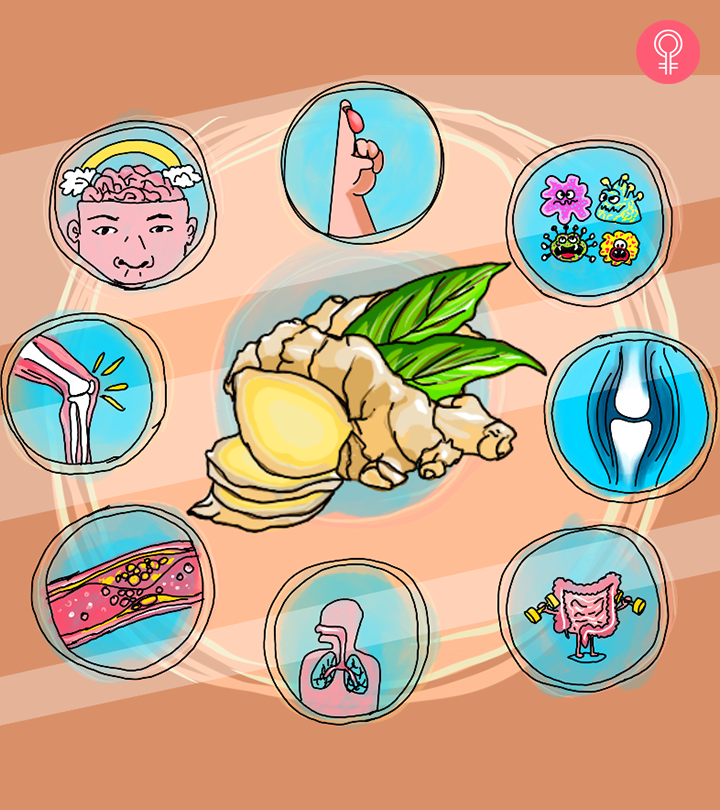9 Signs That Indicate You Are Gluten Sensitive

Image: Shutterstock
Gluten sensitivity is unfortunately one of the most misunderstood conditions that affects millions of people worldwide. Unlike celiac disease, which is an autoimmune disorder triggered by gluten consumption, gluten sensitivity mostly results in a range of unpleasant but less serious symptoms (1). Identifying gluten sensitivity is crucial for those who may be experiencing discomfort after consuming gluten-containing foods. In this article, we will explore some telltale signs that may indicate you are gluten-sensitive. Knowing this can help you make better food choices and lead a healthier life. Read on!
In This Article
1. You Are Suffering From Gastrointestinal Problems
If you find yourself grappling with persistent issues related to your gastrointestinal tract, it could be an indicator of gluten sensitivity (2). Gastrointestinal symptoms are among the most common manifestations of this condition. It is often characterized by discomfort, bloating, diarrhea, or constipation after consuming gluten-containing foods. These symptoms can range from mild to severe and may mimic those of other digestive disorders.
2. Unexplainable Weight Gain
Unexplained weight changes can be a sign of gluten sensitivity. For some people, consuming gluten can lead to unintended fluctuations in weight (3). While some may experience unexplained weight gain, others might notice unexplained weight loss. This happens because gluten sensitivity can affect the body’s ability to absorb nutrients properly, leading to malabsorption and changes in appetite.
3. Hormonal Imbalances
Hormonal imbalance can be another subtle yet significant indicator of gluten sensitivity. While not often associated with this condition, some individuals may experience disruptions in their hormonal regulation when gluten-sensitive. This can manifest as irregular menstrual cycles in women or fluctuations in hormones such as thyroid hormones. These imbalances can lead to a range of symptoms, from mood swings and fatigue to skin issues and reproductive difficulties.
4. Problems With Central Nervous System (CNS)
Experiencing problems with the CNS can be an unexpected but critical sign of gluten sensitivity. While traditionally associated with gastrointestinal symptoms, gluten sensitivity can also affect the nervous system, leading to a range of neurological issues (4). These may include headaches, migraines, mood disturbances, such as anxiety or depression, and even peripheral neuropathy, which involves tingling or numbness in the extremities.
5. Skin And Nail Problems
Skin and nail problems can be external effects of underlying gluten sensitivity. While this condition primarily affects the digestive system, it can also lead to dermatological issues. Gluten sensitivity may also trigger skin conditions such as dermatitis herpetiformis, which results in itchy, blistering skin rashes, often on the elbows, knees, or buttocks (5).
6. Poor Condition Of Your Teeth
The poor condition of teeth, including dental problems like enamel erosion, cavities, or tooth sensitivity, can be indicative of an underlying gluten sensitivity (6). This connection may seem unexpected, but some individuals with gluten sensitivity experience oral health issues due to the potential malabsorption of essential nutrients caused by gluten-related damage to the gut lining. This can lead to deficiencies in vitamins and minerals crucial for maintaining healthy teeth.
7. Iron Deficiency
Iron deficiency anemia is a common condition that can be closely linked to gluten sensitivity (7). When individuals with gluten sensitivity consume gluten-containing foods, it can lead to damage in the small intestine’s lining, impairing the body’s ability to absorb essential nutrients, including iron. This malabsorption of iron can result in anemia, characterized by symptoms such as fatigue, weakness, paleness, and shortness of breath.
8. Autoimmune Diseases
Autoimmune diseases are characterized by the body’s immune system attacking its tissues and organs, and there is growing evidence to suggest a link between gluten sensitivity and various autoimmune disorders. While not everyone with an autoimmune condition has gluten sensitivity, some individuals find that adopting a gluten-free diet can alleviate symptoms and improve their overall well-being (8).
9. ADHD
While the connection between Attention Deficit Hyperactivity Disorder (ADHD) and gluten sensitivity is still a topic of ongoing research, some people with gluten sensitivity have reported improvements in ADHD symptoms when following a gluten-free diet (9). It’s important to note that not everyone with ADHD will have gluten sensitivity, but for a subset of individuals, gluten consumption may exacerbate their symptoms. These can include difficulties with concentration, impulsivity, and hyperactivity.
Being aware of the signs and symptoms of gluten sensitivity is essential for those who suspect that they may be sensitive to gluten. Recognizing these signs and seeking medical guidance for proper evaluation and diagnosis is crucial. A gluten-free diet may be the key to alleviating symptoms and improving the quality of life for gluten sensitive people.



























